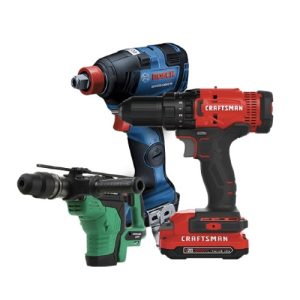Better performance
Often, power tools can perform tasks that are impossible for hand tools to complete. For example, electric power tools make it possible to work with rigid materials like metals or concrete. Some power tools have a specialized design intended to serve highly specific functions or work with certain materials. Many power tools have a range of adjustable settings to enable better control for more involved tasks. Finally, power tools perform the same functions as hand tools with significantly less effort and energy, leaving you with more energy at the end of the day.
Often, power tools can perform tasks that are impossible for hand tools to complete. For example, electric power tools make it possible to work with rigid materials like metals or concrete. Some power tools have a specialized design intended to serve highly specific functions or work with certain materials. Many power tools have a range of adjustable settings to enable better control for more involved tasks. Finally, power tools perform the same functions as hand tools with significantly less effort and energy, leaving you with more energy at the end of the day.
Corded vs. cordless
One of the most important decisions to make when searching for the best power tools to buy is whether to choose a corded or cordless tool. Many handheld power tools come in corded and cordless variants. Each variety has its own benefits and drawbacks that are important to consider. Corded power tools offer the advantage of lasting performance and efficiency in exchange for maneuverability as they require a connection to an outlet to operate. Cordless power tools have greater versatility as you can take them anywhere. However, they do need to charge regularly and you might need an extension cord if there isn’t an outlet close by. When buying cordless power tools, the three primary qualities you should be on the lookout for are voltage, amperage, and battery capacity in kilowatt-hours (kWh). Together they determine how much charge the tool uses when in operation, how powerful the tool is, and which battery packs the tool is compatible with.
One of the most important decisions to make when searching for the best power tools to buy is whether to choose a corded or cordless tool. Many handheld power tools come in corded and cordless variants. Each variety has its own benefits and drawbacks that are important to consider. Corded power tools offer the advantage of lasting performance and efficiency in exchange for maneuverability as they require a connection to an outlet to operate. Cordless power tools have greater versatility as you can take them anywhere. However, they do need to charge regularly and you might need an extension cord if there isn’t an outlet close by. When buying cordless power tools, the three primary qualities you should be on the lookout for are voltage, amperage, and battery capacity in kilowatt-hours (kWh). Together they determine how much charge the tool uses when in operation, how powerful the tool is, and which battery packs the tool is compatible with.
DIY with less difficulty
Overall, electric power tools offer a wide range of benefits and are an excellent choice for any project ― big or small. They let you carry out more specialized tasks and work with a wide variety of materials. These tools offer steadfast consistency and produce highly accurate results. Finally, they perform the same functions as hand tools with considerably more efficiency and less effort. The advantages of using power tools mean you can tackle almost any DIY project with ease.
Overall, electric power tools offer a wide range of benefits and are an excellent choice for any project ― big or small. They let you carry out more specialized tasks and work with a wide variety of materials. These tools offer steadfast consistency and produce highly accurate results. Finally, they perform the same functions as hand tools with considerably more efficiency and less effort. The advantages of using power tools mean you can tackle almost any DIY project with ease.



